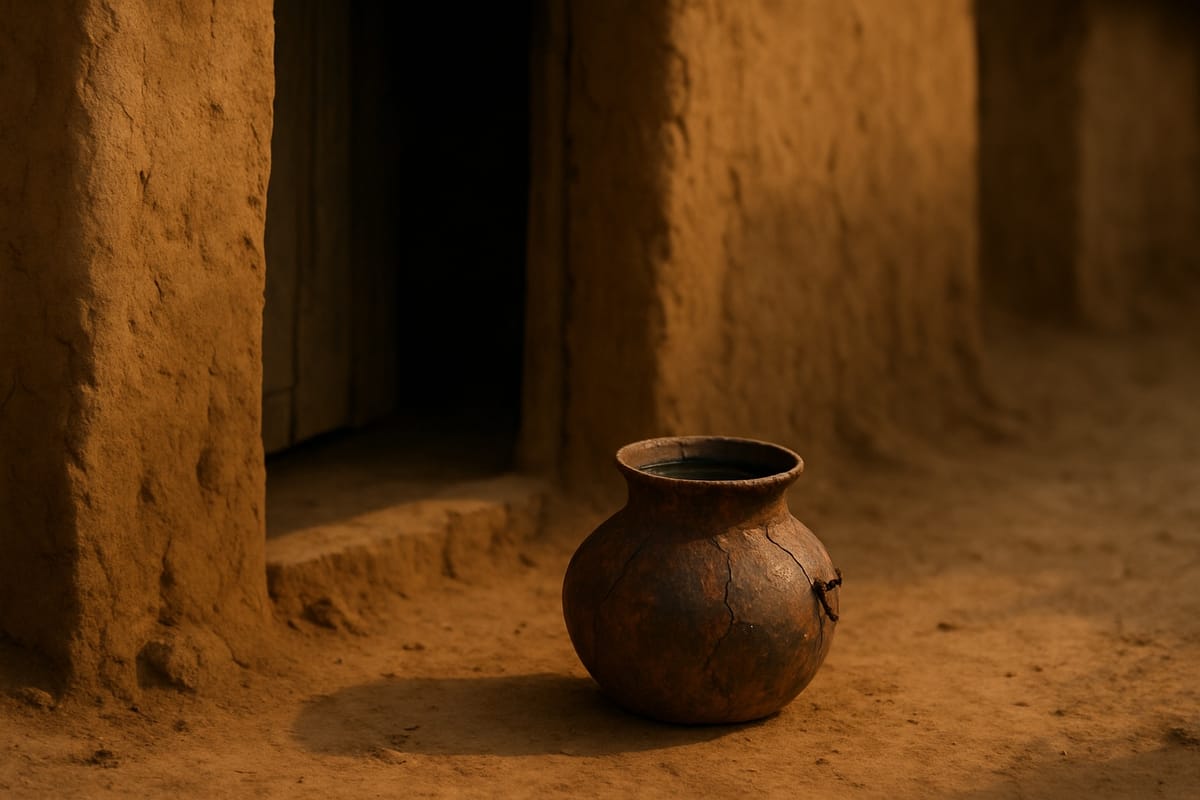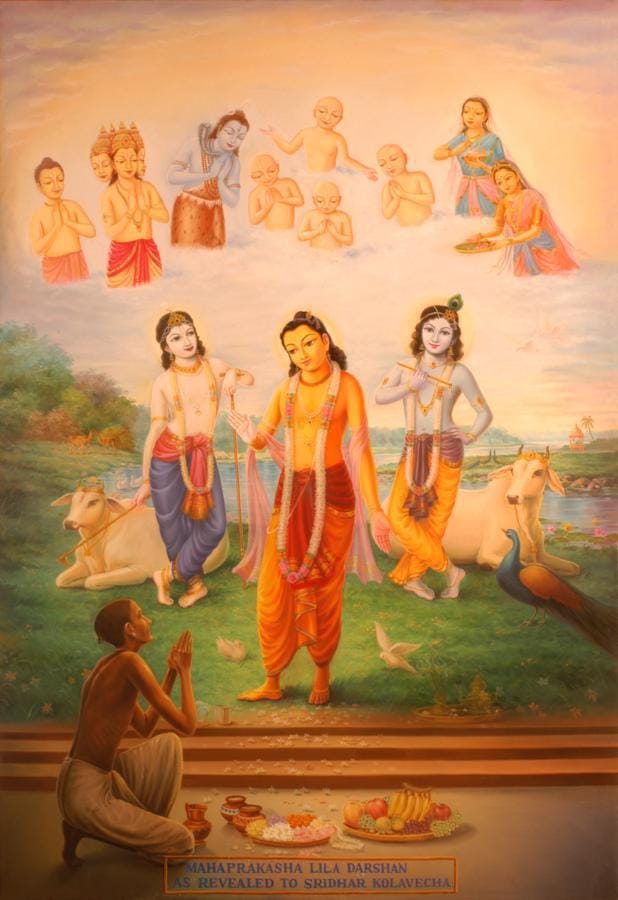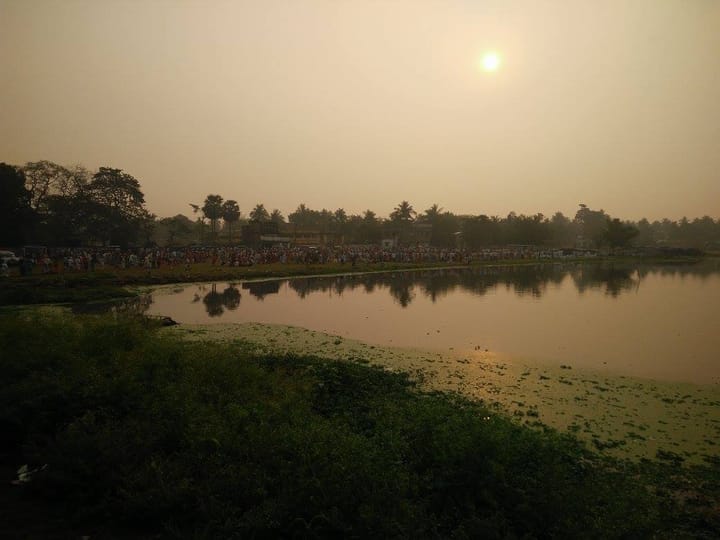Mahāprabhu's Love for the Unseen Devotee (Part Three)

Today, on the auspicious disappearance day of Śrīla Vṛndāvana dāsa Ṭhākura—the Vyāsadeva of Śrī Caitanya Mahāprabhu's pastimes—I'm honored to share the third installment in this series of excerpts from his Śrī Caitanya-bhāgavata. These passages illuminate the extraordinary glories of Śrī Śrīdhara Paṇḍita and Mahāprabhu's unfathomable love for him.
In Part One, you can read the sweet quarrels between the Lord and Śrīdhara, and in Part Two, you can read the heart-melting pastime of when Mahāprabhu revealed Himself to Śrīdhara Paṇḍita.
Now, in Part Three, we come to an astonishing pastime: Mahāprabhu drinking water from Śrīdhara's iron pot—a vessel meant only for external use. This episode, drawn from Śrī Caitanya-bhāgavata (Madhya-khaṇḍa 23.418–494), demonstrates the Lord's affection for His devotee, the nature of a devotee's prema, and the glory of their remnants.
Victorious Saṅkīrtana
Having rectified the Kazi, Mahāprabhu, the Lord of all, danced onward with all His associates, absorbed in saṅkīrtana-rasa (418). Mṛdaṅga drums and mandirā cymbals resounded, along with conch shells and karatālas, amidst shouts of “Jaya Rāma! Kṛṣṇa! Jaya Govinda! Gopāla!” (419). Having broken the Kazi's residence, all the townspeople, immersed in tremendous bliss, danced onward, joyfully chanting "Hari! Hari!" (420). The hearts of the atheists (pāṣaṇḍīs) were utterly shattered by these events. While the pāṣaṇḍīs sank into dejection, the Vaiṣṇavas reveled in ecstatic delight (421).
"Jaya Kṛṣṇa! Mukunda! Murāri! Vanamālī!" sang all the townspeople in unison, clapping their hands in time (422). Tumultuous cries of “jaya!” reverberated in village after village. All the people floated in an ocean of bliss (423). Who danced in which direction? Who sang, who played instruments? In the ecstatic commotion, no one could even tell who was running in which direction (424).
The devotees danced at the forefront of the procession, while Mahāprabhu Śrī Śacīnandana danced behind them (425). Lord Brahmā, Lord Śiva, and Lord Ananta Himself led the kīrtana, while Mahāprabhu, the crest-jewel of all Vaiṣṇavas, danced (426). Do not entertain any doubt whatsoever in your mind regarding this, for the Lord Himself mercifully declared it (427).
Journey Through Navadvīpa
Accompanied by innumerable crores of people, Viśvambhara entered the village of the conch shell merchants (428). Great jubilation arose in the village of the conch shell merchants. Chanting "Hari!", they played mṛdaṅgas, bells, and sounded their conch shells (429). Viśvambhara danced along a path strewn with flowers, while on all sides, beautiful lamps burned brightly (430). How can I possibly describe the beauty of that moonlit night, graced by Gaurāṅga Śrī Hari Himself performing kīrtana? (431). At every doorway were auspicious decorations: full waterpots, banana trees, and mango sprouts. The women joyfully chanted "Hari!" and raised cries of “jaya!” (432)
Proceeding thus, gracing all the villages, the Lord arrived at the village of the weavers (433). Auspicious sounds and tumultuous cries of “jaya!” erupted as all the weavers became completely overwhelmed with ecstatic bliss upon the Lord's arrival (434). All the townspeople danced, clapping their hands and chanting, "Hari bolo! Mukunda! Gopāla! Vanamālī!" (435). Hearing the holy name of Hari resonating from everyone’s mouth, the Lord smiled with satisfaction. Dancing onward, He proceeded towards the humble dwelling of Śrīdhara (436).
Water from the Devotee’s Patched Iron Pot
Śrīdhara's dwelling consisted of just one dilapidated hut. The Lord arrived, entering that humble abode (437). At the doorway sat just one old iron water pot, patched up in countless places – a pot so worthless that even a thief wouldn't bother to steal it (438). As Mahāprabhu danced in Śrīdhara's courtyard, He noticed the iron pot, filled with water (439).
Then, to reveal the nature of a devotee's prema, Śrī Śacīnandana instantly lifted that iron pot. Mahāprabhu blissfully drank the water – and who possessed the power to forbid Him?
"I am ruined! I am ruined!" cried Śrīdhara, "He has come to my house to destroy me!" (440-442). Saying this, the pious Śrīdhara fell down unconscious.
But the Lord declared, "Today, My body has become purified (443). Today bhakti unto Śrī Kṛṣṇa’s lotus feet has awakened within Me, at the very moment I drank Śrīdhara’s water (444). Now, truly, I have attained devotion to Lord Viṣṇu!" As He spoke these words, tears streamed incessantly from His eyes (445).
“By drinking the water remnants of a Vaiṣṇava, devotion to Lord Viṣṇu certainly arises.”—thus the compassionate Gaurāṅga instructed everyone present (446). In the Padma Purāṇa (Ādi-khaṇḍa 31.112) it is stated: “prārthayed vaiṣṇavasyānnaṁ, prayatnena vicakṣaṇaḥ / sarva-pāpa viśuddhy arthaṁ, tad abhāve jalaṁ pibet — A wise person should earnestly endeavor and beg for the food remnants of a Vaiṣṇava for the purification of all sins. If such food is unavailable, one should then drink their remnant water or water that has washed their feet.” (447).
Witnessing the Lord’s affection for His devotee (bhakata-vātsalya), all the assembled devotees began to cry in ecstasy (448). Śrī Nityānanda and Śrī Gadādhara Paṇḍita fell down weeping. Advaita Ācārya and Śrīvāsa Paṇḍita also cried, falling upon the ground (449). Haridāsa Ṭhākura, Gaṅgādāsa Paṇḍita, and Vakreśvara Paṇḍita cried; Murāri Gupta, Mukunda Datta, and Śrī Candraśekhara Ācārya also cried (450). Govinda Ghoṣa, Govindānanda, Śrīgarbha Paṇḍita, and Śrīmān Paṇḍita cried; Kāśīśvara Paṇḍita, Śrī Jagadānanda Paṇḍita, and Rāmadāsa Abhirāma also cried (451). Jagadīśa Paṇḍita and Gopīnātha Ācārya cried, Nandana Ācārya cried; Śuklāmbara Brahmacārī, Garuḍa Paṇḍita and, indeed, everyone present cried (452). Lakhs and crores of people wept, placing their hands upon their heads and crying, “O Kṛṣṇa! O Ṭhākura! My Lord and master, refuge of the helpless!” (453).
The Lord's Purpose Fulfilled
I am unable to fully describe what transpired at Śrīdhara's humble dwelling. Prema-bhakti manifested there in every way (454). As everyone chanted the name of Kṛṣṇa and cried in ecstatic joy, Gauracandra smiled, for His divine purpose was now fulfilled (455). Behold, my brothers, the extraordinary glory of this devotee! Indeed, the Lord displayed the very pinnacle of affection (vātsalya) for His loving servants. (456).
It was an iron waterpot filled with water meant only for external use – yet the Lord drank it all with the greatest loving appreciation (457). As soon as the Lord's transcendental desire to drink arose, that humble devotee's water instantly transformed into the sweetest nectar (458). It was specifically to illustrate the principle of bhakti that the Lord drank water from such a pot. From the transcendental perspective, everything related to a Vaiṣṇava is perfectly pure (459).
The Lord Is Conquered by His Servant
The Lord does not even glance upon a proud person’s grand offering of water in a jewel-studded vessel, let alone drink from it. Yet, He readily accepts any humble substance offered by His loving servant in any condition, without waiting for the formalities prescribed for making offerings. If the servant hesitates to offer even a meagre item, the Lord snatches and eats it by force. The chipped rice offered by the poor brāhmaṇa (Sudāmā) in Dvārakā stands as proof of this. Ultimately, the Lord accepts His servant as non-different from Himself – Yudhiṣṭhira's simple forest greens offered during exile [which the Lord lovingly ate] is a clear example of this. The servant may appear as Kṛṣṇa’s father, mother, wife, or brother—but aside from “dāsa,” there is no second identity in relation to Kṛṣṇa.
The Lord assumes the very form His servant meditates upon, and His servant holds the power even to sell Him. The four Vedas declare, "The Lord is deeply affectionate towards His servants.” Indeed, Kṛṣṇa always reveals Himself fully in the presence of His devoted servant (460-466).
Behold the sublime influence of the Lord's servant to the full satisfaction of your eyes, and then cultivate deep loving attachment to Kṛṣṇa in such a mood of pure servitude (467).
The Unrivaled Glory of Servitude
Never consider the designation ‘kṛṣṇa-dāsa’ to be insignificant. Bhagavān does not accept one of meager fortune as ‘dāsa’ (468). One who performs their prescribed duties for countless lifetimes, acting always with non-violence and sincerity, and who prays day and night in the mood of a servant, utters the name “Nārāyaṇa” at the time of death (469-470). Then one becomes liberated, and all material bondage is destroyed. Having thus attained liberation, one becomes a servant of Lord Govinda (471).
This explanation is given amongst the assembly of learned commentators: All liberated souls worship Kṛṣṇa in their eternal forms suited for His divine pastimes (līlā-tanu) (472). [In his commentary on Śrīmad-Bhāgavatam 10.87.21, Śrīdhara Svāmī quotes Sarvajña (Viṣṇusvāmī) as follows:] “muktā api līlayā vigrahaṁ, kṛtvā bhagavantaṁ bhajante—even the liberated beings constantly render service to Bhagavān with their transcendental bodies.” (473).
Therefore, the devotee is as good as the Lord Himself. Indeed, in the presence of His pure devotee, Bhagavān willingly accepts defeat (474). Of all the garlands of praise that exist within the infinite universes, not a single one contains even a fraction of the praise befitting a devotee (475). Lord Brahmā and Lord Śiva feel ecstatic joy on being addressed as “dāsa”. Lord Ananta Śeṣa, who supports the universes, also desires the qualification to serve the Lord (476). All these great personalities are equal to the Lord Himself and are devotees by their very nature, yet still they remain intensely desirous of attaining the position of a devotee (477).
Advaita Prabhu feels great joy speaking about such devotees. Sinful persons, however, suffer greatly due to the consequences of their own misdeeds and offenses (478). Kṛṣṇa feels immense satisfaction simply hearing the name 'bhakta'. Besides Lord Kṛṣṇacandra Himself, who else can truly know His devotee? (479).
Dancing in Śrīdhara's Courtyard
Behold this divine power belonging to the Lord of all, Gauracandra, the beloved son of Mother Śacī, and fill your eyes to the brim (483). By His mere wish, countless millions gathered there. How many millions of great lamps began burning (484). Who planted all those banana trees decorating every single doorway? Who sang? Who played the instruments? Who caused the shower of flowers? [All happened by the Lord's mystic potency] (485).
He simply drank Śrīdhara's water, and what then transpired as the very abode of prema manifested, I cannot fully comprehend or describe (486). Witnessing such profound affection for His devotee, all the three worlds wept. Some rolled upon the ground in ecstasy, their hair unbound and disheveled (487).
Śrīdhara wept, holding a blade of grass between his teeth in humility, and loudly cried out “Hari!” with tear-filled eyes (488). “What water has Tridaśa Rāya (the King of the demigods) drunk!” Lamenting thus, Śrīdhara danced, wept, and cried out “Hāya hāya! Alas, alas!” (489).
Having drunk His devotee’s water, Viśvambhara, the supreme Lord of Vaikuṇṭha, danced in Śrīdhara's courtyard (490). His dear associates surrounded Him on all four sides, singing, absorbed in mahā-rasa, while Nityānanda Prabhu and Gadādhara Paṇḍita shined beautifully on both sides (491).
Bhakti Reigns Supreme
Just behold the boundless good fortune of this humble servant who sold banana products. Seeing his glories, even Lord Brahmā and Lord Śiva weep (492). One cannot attain Śrī Kṛṣṇa through wealth, followers, or scholarship; Śrī Caitanya Gosā̃i is controlled exclusively by pure bhakti (493). Having thus bestowed His unparalleled mercy upon Śrīdhara by drinking his water, Lord Gaurāṅga Śrī-Hari returned once more towards the town (494).



Comments ()